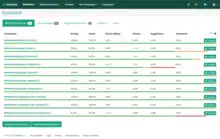Weblate
Weblate is an open source web-based translation tool with version control. It includes several hundred languages with basic definitions, and enables the addition of more language definitions, all definitions can be edited by the web community or a defined set of people, as well as through integrating machine translation, such as DeepL, Amazon Translate, or Google Translate.[4]
 | |
 | |
| Original author(s) | Michal Čihař |
|---|---|
| Developer(s) | github/weblate |
| Initial release | March 2012 |
| Stable release | 5.1[1] |
| Repository | |
| Written in | Python |
| Operating system | Cross-platform |
| Available in | 108 languages[2] |
List of languages Abkhazian, Afrihili, Albanian, Arabic, Arabic (Libya), Arabic (Najdi), Armenian, Asturian, Azerbaijani, Basque, Belarusian, Belarusian (Latin), Bengali, Bengali (Bangladesh), Berber, Breton, Bulgarian, Burmese, Catalan, Chechen, Chinese (Literary), Chinese (Simplified), Chinese (Traditional), Chuvash, Colognian, Crimean Tatar, Croatian, Czech, Danish, Dhivehi, Dutch, English (Middle), English (Old), English (United Kingdom), Esperanto, Estonian, Filipino, Finnish, Frisian, Friulian, Galician, Georgian, German, Greek, Hebrew, Hindi, Hungarian, Indonesian, Interlingua, Italian, Japanese, Kabyle, Kazakh, Khmer (Central), Klingon, Korean, Kurdish (Central), Kurdish (Northern), Latvian, Lingala, Lithuanian, Macedonian, Malay, Malayalam, Marathi, Norwegian Bokmål, Norwegian Nynorsk, Occidental, Occitan, Odia, Pashto, Persian, Persian (Old), Polish, Portuguese, Portuguese (brazil), Portuguese (Portugal), Punjabi, Punjabi (Pakistan), Romanian, Russian, Sardinian, Serbian, Serbian (Latin), Sinhala, Slovak, Slovenian, Spanish, Swahili, Swedish, Tamazight (Central Atlas), Tamazight (Standard Moroccan), Tamil, Tatar, Telugu, Thai, Tibetan, Toki Pona, Turkish, Ukrainian, Uyghur, Uzbek, Vietnamese, Welsh, Yue | |
| Type | Computer-assisted translation |
| License | GNU GPLv3+[3] |
| Website | weblate |
Stated goals
Weblate aims to facilitate web based translation with tight Git integration for a wide range of file formats, helping translators contribute without knowledge of Git workflow.
Translations closely follow development, as they are hosted within the same repository as the source code. There is no plan for heavy conflict resolution, as it is argued these should primarily be handled on the Git side. [5]
Project name
The project's name is a portmanteau of words web and translate.
Notable uses
These are some projects using Weblate:
- Godot Engine
- FreePBX[6]
- OsmAnd[7]
- phpMyAdmin[8]
- Organic Maps[9]
- Unknown Horizons[10]
- OpenPetra [11]
- Turris Omnia[12]
- Debian Handbook[13]
- LibreOffice and Collabora Online[14]
- Monero[15]
- openSUSE[16]
- Open Journal Systems[17]
- H5P[18]
- Kodi[19]
- CryptPad[20]
- ParaView[21]
- SCP: Secret Laboratory[22]
References
- "Release 5.1". 16 October 2023. Retrieved 20 October 2023.
- "Weblate translations".
- "Weblate: License".
- Bantle, Ulrich (2019). "Translation tool with version control". Admin Network and Security. Retrieved 2023-08-08.
- Supported file formats in Weblate
- Translating FreePBX with Weblate
- "OsmAnd - Offline Mobile Maps and Navigation". Archived from the original on 2019-03-31. Retrieved 2019-03-31.
- Translating phpMyAdmin
- "Weblate website for Organic Maps".
- Weblate replaces Pootle for managing translations
- OpenPetra Documentation for Translators
- How to Participate in the Foris Interface Translation
- "Web based translation system". 5 June 2013.
- https://translations.documentfoundation.org/
- https://translate.getmonero.org/
- https://l10n.opensuse.org/
- Translate PKP Software
- "Translate H5P".
- "News | Switching Translations to Weblate". kodi.tv. Retrieved 2021-07-13.
- https://weblate.cryptpad.fr/
- "ParaView".
- https://translate.scpslgame.com/